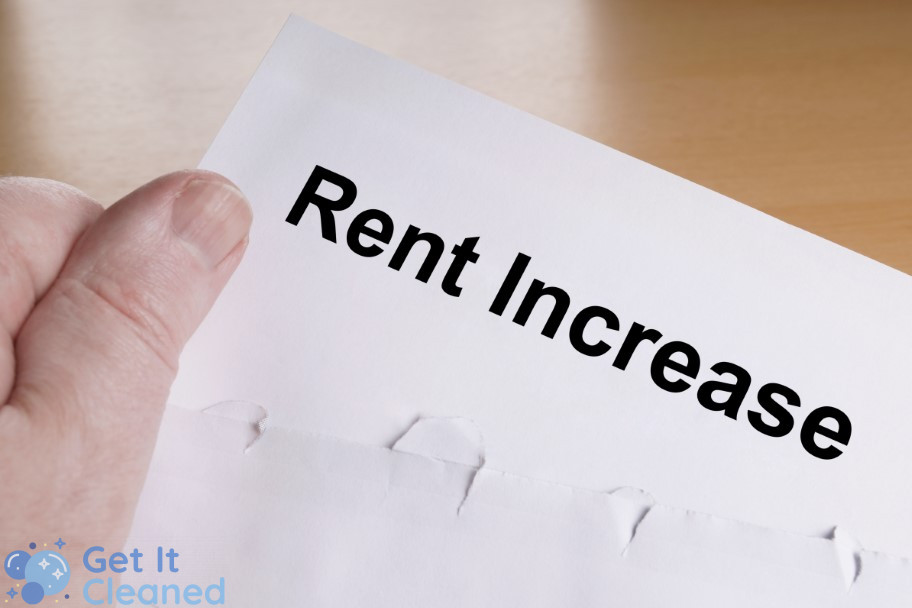Got a notice of a rent increase from the landlord? Increasing rent is a common issue tenants face across the UK. You are not the only one. Rent has been going up like crazy for awhile all over the UK. So, you need to know your tenancy agreement really well if you want to make sure the landlord doesn’t increase your rent more than you can afford.
Landlords must provide at least one month’s notice for tenants who pay rent monthly or weekly before increasing the rent.
Rent Increases in the UK – How it Started
Rent increases in the UK are governed back in the past by the Housing Act 1988, which sets out the rules for landlords to follow when increasing rent. The rules of course vary depending on the type of tenancy agreement you have, fixed or periodic. For example in a fixed term the rent can’t be increased unless there’s a rent review clause in the tenancy agreement. With a periodic tenancy you can increase the rent with proper notice, so tenants are kind of protected from big hikes. Understanding the differences is key for both tenants and landlords to navigate rent increases smoothly.



The different types of tenancy agreements
Step one would be to check what your tenancy agreement type is:
- Fixed term tenancy agreement
- Periodic tenancy
- Yearly tenancy
Fixed term tenancy comes with a fixed period for your tenancy – 6-12 months usually. Fixed term tenancies are agreements that last for a specified period, typically 6-12 months. Unless your fixed term contract explicitly says so in a rent review clause, your landlord can’t raise your rent during that period. So, check if you are under a fixed term tenancy agreement.
Once the fixed term ends, the landlord can ask you to sign a new agreement with a rent increase. This new tenancy agreement will outline the new rent amount and any other changes to the terms of your tenancy.
For periodic tenancies, landlords must provide at least one month’s notice for any rent increases.
Fixed Term Tenancy – one of the types
With a fixed term tenancy the landlord can only increase the rent if the tenancy agreement has a rent review clause and that should be somewhere in the contract. This clause must state the date and notice period for the rent increase and how the new rent will be calculated. If there’s no rent review clause the landlord can’t just increase the rent during the fixed term of the tenancy unless the tenant agrees to an amendment to the tenancy agreement – which of course is not going to happen. So during the fixed term the tenant has the security of knowing their rent will be steady unless they agree to a change. Always check your fixed term tenancy agreement for rent review clauses to know your rights and obligations.
You Need to Check Your Tenancy Agreement
It’s important for you as tenants to check their tenancy agreement to understand the rules around rent increases. The agreement should state the type of tenancy (but not always), the rent and any rent review clause. Tenants should also check the agreement to see if it has provisions for rent increases such as a percentage increase or a specific date for review. By checking your tenancy agreement you’ll be definitely better prepared for any rent increases and ensure they are in line with what was agreed in the first place. This proactive approach will help avoid disputes and ensure a fair process.
So, when can the landlord increase rent?
Both yearly tenancy and fixed term agreements don’t allow landlords to increase rent unless you consent to it. Once the fixed term ends, the landlord can ask you to sign a new agreement with a rent increase. If you don’t sign but continue on a periodic tenancy basis, rent increases are allowed as well. Periodic tenancies, which replace fixed-term tenancies under the new Renters’ Rights Bill, allow landlords to raise the rent with proper notice.
For period tenancy schemes, your landlord can increase your rent, but there are many strict rules to follow. The proper procedures have been put in place to protect tenants in most cases. The landlord will have to give you a written notice (letter or email) of the proposed rent increase. For tenants who pay rent monthly or weekly, the landlord must provide at least one month’s notice before the increase takes effect. While the legal requirement is one month’s notice, providing two months’ notice can help maintain a good relationship with tenants, which sometimes is not the case. Landlords must follow legal procedures when they decide to raise the rent, ensuring compliance with the Renters’ Rights Bill. They also need to make sure that they are complying with market rates. That means the market limits how much the can a landlord increase rent under periodic tenancy.
Another really important thing that you need to be aware of is that the rent can go up once a year. The only exception would be if the rent review clause in your tenancy agreement explicitly states otherwise.

Moving Out in London? Let us Clean!
Pass your checkout inspection. 500+ deposits secured for London tenants.
Get QuoteSuspect your rights are being violated?
A rent tribunal will help you if you think that your landlord doesn’t have the right to increase your rent with as much as they did. Private landlords must adhere to the same regulations and can be challenged if they fail to comply.
The tribunal monitors current market conditions and their role is to asses if a fair rent increase has been handed to you. Ensuring a fair rent increase helps landlords maintain a stable rental income while protecting tenants from excessive hikes. The landlord should always make sure that the new rent matches market rates and is roughly similar to that of other properties in the local area.
Rent Review Clause and Rent Increase Notice – what to look out for
All rules regarding rent increase should be included in your tenancy agreement. Look for the rent review clause in the contract and see if the landlord has outlined the rules about how they, as a landlord can increase the money you owe them each month. The tenancy period, whether month-to-month or quarter-to-quarter, will dictate the notice period required for any rent increase. A private landlord that tries to increase the rent without written evidence and following the due legal process may fail, and even be liable before court. All rent increases must be accompanied by a Section 13 notice. What is more, the landlord should give you at least a month’s notice before raising your rent. What is even more important, both parties, e.g. you and the landlord must mutually agree you are talking about a fair rent increase.
Known what is the most a landlord can raise rent in UK is crucial if you want to live through rent increases with confidence you are not being cheated. Whenever you doubt you understand something, don’t hesitate to reach out to your local tenant’s association, who will be happy to help out.

